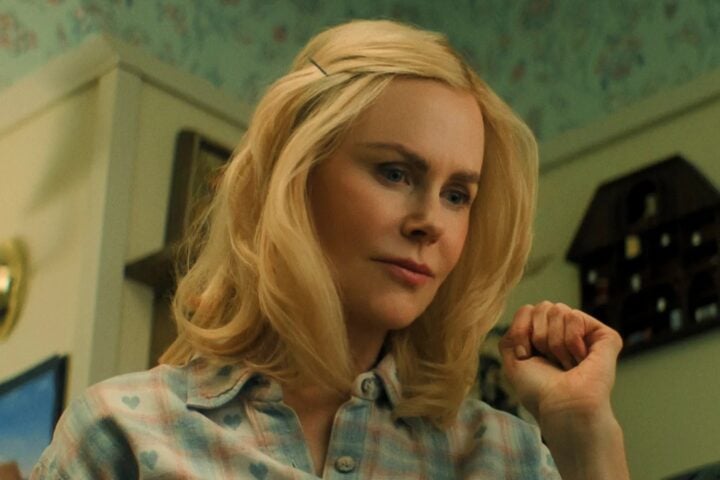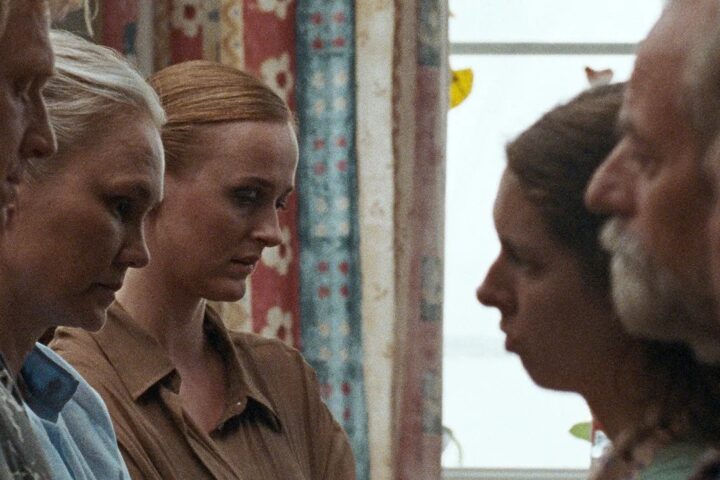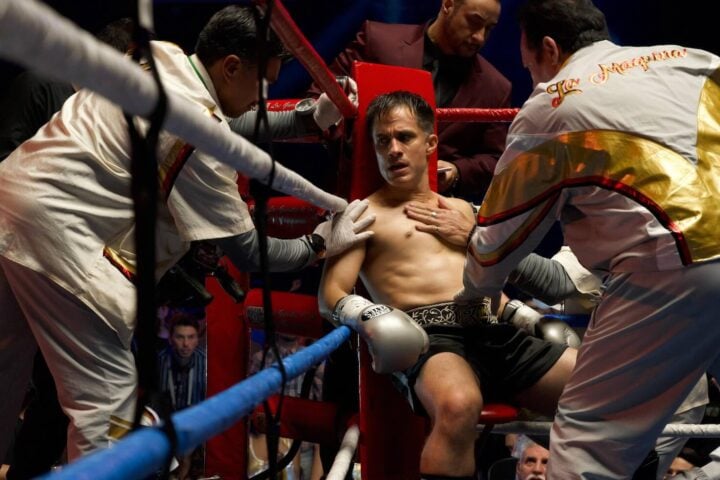When it comes to director Piero Messina’s Another End, it’s almost necessary to begin with its ending. But only to say that its denouement isn’t unlike that of M. Night Shyamalan’s Sixth Sense, for how it confers meaning retroactively to the plot and will, most likely, leave you dumbfounded. Revealing more would mean spoiling this science-fiction film, which is as guilty of overtly sentimental dialogue as it is meticulous about revealing the rules of its world little by little. The screenplay’s last-minute plot twist is so astonishing that it all but makes one forget the hackneyed elements that structure the film.
What the atmosphere of Another End tells us from the start is that the world has become a perpetual penumbra. Its inhabitants look disaffected, if not depressed. That’s certainly the case with Sal (Gael García Bernal), who enters his elderly neighbor’s apartment to fix her shower with a look of complete apathy and doesn’t bat an eye when men randomly come into the room to take the body of the neighbor’s husband away in what looks like a body bag.
As it turns out, the reason for the uncanniness of this world has to do with the omnipresence of a technology, created by the titular company, that instills the memories of the deceased into willing “hosts” so as to provide comfort to the grieving. In the world of Another End, the temporary lending of one’s body for such practices is as banal as donating plasma, particularly, it seems, for the underclass and the emotionally destitute. And yet, you sense—for this is a film that isn’t exactly forthcoming—that most hosts don’t willingly lend their bodies just for the money, but for the sake of warding off their demons and not having to take their own lives.
Regarding the particulars of the procedure, the host is implanted with a dead person’s memories for a specific amount of time, during which they interact with the family of the deceased without being able to remember that, in reality, they’re someone else. During these sessions, the host truly believes that they’re the deceased and that they aren’t yet dead. It behooves the family, then, to act as though there’s no physical discrepancy between their loved one’s original body and that of the host. The idea is that the host will help the family in the mourning process, allowing them to spend a bit more time with the dead person before saying goodbye forever.
Sal’s involvement in this is much deeper than what he witnesses at the neighbor’s apartment. His sister, Ebe (Bérénice Bejo), works for Another End, and she keeps trying to convince him to partake in sessions with a host found to be “compatible” with his girlfriend, who recently died in a car crash while Sal was at the wheel. Sal is reluctant but finally gives in, and is at once distraught and transfixed by the time that he spends with Zoe (Renate Reinsve), during which he has to pretend like his girlfriend never actually died, for if Zoe starts to doubt whether she really is the girlfriend, the whole experiment breaks down for good.
The DNA of Another Life’s plot is traceable to several notable films, including Yorgos Lanthimos’s Alps, where strangers play-acted as the recently deceased to help with their family’s bereavement, and Brandon Cronenberg’s Infinity Pool, where a technology that makes exact replicas of foreigners who get in trouble with the law is used to punish the dummy and let the foreigner get off scot-free. But what sets Messina’s film apart is the fact that the material reality of the body is rendered all but irrelevant to the process of mourning or make-believe.
The film, as written by Messina, Giacomo Bendotti, and Valentina Gaddi, frustrates as much as it fascinates for the way it leaves all sorts of questions hanging in the air unanswered. For one, is a person alive if their memories can be mobilized by someone else, or only if both body and mind exist as one? But once it springs its shocker of an ending, Another End tenaciously casts a net woven of implications over what’s come before, and in ways that are haunting.
Messina’s film has us ponder the potential of the technology at its center to leave a trace—some irrevocable imprint—on the psyche of the host, before then having us grapple with more existential matters. If there’s no such thing as “being,” because we’re all fungible screens for someone else’s projections, is life even worth living? Despite its initially familiar trajectory, Another End disarmingly and purposefully sweeps us away on a wave of apathy not unlike that which plagues Sal, challenging our sense of who we fundamentally are as humans.
Since 2001, we've brought you uncompromising, candid takes on the world of film, music, television, video games, theater, and more. Independently owned and operated publications like Slant have been hit hard in recent years, but we’re committed to keeping our content free and accessible—meaning no paywalls or fees.
If you like what we do, please consider subscribing to our Patreon or making a donation.






